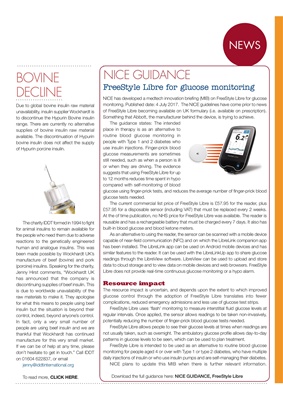
NEWS
NICE GUIDANCE
FreeStyle Libre for glucose monitoring
NICE has developed a medtech
innovation briefing (MIB) on FreeStyle
Libre for glucose monitoring. Published
date: 4 July 2017.
The NICE guidelines have come prior
to news of FreeStyle Libre becoming
available on UK formulary (i.e. available on
prescription). Something that Abbott, the
manufacturer behind the device, is trying
to achieve.
The guidance states: The intended place in therapy is as an alternative to routine
blood glucose monitoring in people with Type 1 and 2 diabetes who use insulin injections.
Finger-prick blood glucose measurements are sometimes still needed, such as when a
person is ill or when they are driving.
The evidence suggests that using FreeStyle Libre for up to 12 months reduces time
spent in hypoglycaemia compared with self-monitoring of blood glucose using fingerprick tests,
and reduces the average number of finger-prick blood glucose tests needed.
The current commercial list price of FreeStyle Libre is £57.95 for the reader, plus
£57.95 for a disposable sensor (including VAT) that must be replaced every 2 weeks.
At the of time publication, no NHS price for FreeStyle Libre was available. The reader
is reusable and has a rechargeable battery that must be charged every 7 days. It also
has built-in blood glucose and blood ketone meters, which can be used with FreeStyle
Optium blood glucose strips or Optium Beta ketone test strips to test finger-prick blood
samples.
As an alternative to using the reader, the sensor can be scanned with a mobile device
capable of near-field communication (NFC) and on which the LibreLink companion app
has been installed. The LibreLink app can be used on Android mobile devices and has
similar features to the reader. It can be used with the LibreLinkUp app to share glucose
readings through the LibreView software. LibreView can be used to upload and store
data to cloud storage and to view data on mobile devices and web browsers. FreeStyle
Libre does not provide real-time continuous glucose monitoring or a hypoglycaemia
alarm.
Resource impact
The resource impact is uncertain, and depends upon the extent to which improved
glucose control through the adoption of FreeStyle Libre translates into fewer
complications, reduced emergency admissions and less use of glucose test strips.
FreeStyle Libre uses 'flash' monitoring to measure interstitial fluid glucose levels at
regular intervals. Once applied, the sensor allows readings to be taken non-invasively,
potentially reducing the number of finger-prick blood glucose tests needed. This avoids
the pain caused by finger-prick sampling, which can deter people with diabetes from
taking regular measurements.
FreeStyle Libre allows people to see their glucose levels at times when readings are
not usually taken, such as overnight. The ambulatory glucose profile allows day-to-day
patterns in glucose levels to be seen, which can be used to plan treatment.
FreeStyle Libre is intended to be used as an alternative to routine blood glucose
monitoring for people aged 4 or over with Type 1 or type 2 diabetes, who have multiple
daily injections of insulin or who use insulin pumps and are self-managing their diabetes.
NICE plans to update this MIB when there is further relevant information.
Download the PDF of the full guidance here: NICE GUIDANCE, FreeStyle Libre
Due to global bovine insulin raw material
unavailability, insulin supplier Wockhardt is
to discontinue the Hypurin Bovine insulin
range. There are currently no alternative
supplies of bovine insulin raw material
available. The discontinuation of Hypurin
bovine insulin does not affect the supply
of Hypurin porcine insulin.
The charity IDDT formed in 1994 to fight
for animal insulins to remain available for
the people who need them due to adverse
reactions to the genetically engineered
human and analogue insulins. This was
been made possible by Wockhardt UK's
manufacture of beef (bovine) and pork
(porcine) insulins. Speaking for the charity,
Jenny Hirst comments, "Wockhardt UK
has announced that the company is
discontinuing supplies of beef insulin. This
is due to worldwide unavailability of the
raw materials to make it. They apologise
for what this means to people using beef
insulin but the situation is beyond their
control, indeed, beyond anyone's control.
In fact, only a very small number of
people are using beef insulin and we are
thankful that Wockhardt has continued
manufacture for this very small market.
If we can be of help at any time, please
don't hesitate to get in touch." Call IDDT
on 01604 622837, or email
jenny@iddtinternational.org
To read more, CLICK HERE.
BOVINE
DECLINE